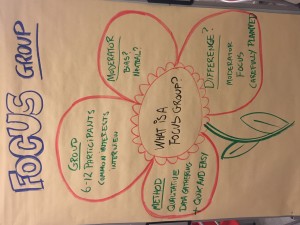What is a focus group?
A focus group is basically a group interview.
A group facilitator/moderator guides the group based on a predetermined set of topics. The facilitator creates an environment that encourages participants to share their perceptions and points of view. He asks e.g. as open questions as possible and keeps the session focussed. He avoids giving personal opinions and to influence participants possessions or opinions.
Who and how many are the participants?
There are approximately six to twelve people who share similar characteristics or common interests. This could e.g. be parents or teacher.
What kind of research method is it?
Focus groups are a qualitative data collection method, meaning that the data is descriptive and cannot be measured numerically.
When to use a focus group?
- You can use a focus group in the priliminary status of a study. It can help to explore or generate and develope questions or concepts for questionnaires and interview guides.
- You can use it to get more in-depth information on perceptions, insights, attitudes, experiences, or beliefs
- …or to gather additional information as an adjunct to quantitative data collection methods.
- It can also be part of a mixed method evaluation approach.
Advantages/disadvantages of a focus group:
Advantages
- Quick and relatively easy to set up.
- The group dynamic can provide useful information that individual data collection does not provide.
- Is useful in gaining insight into a topic that may be more difficult to gather through other data collection methods.
Disadvantages
- Susceptible to facilitator bias.
- The discussion can be dominated or sidetracked by a few individuals.
- Data analysis is time consuming and needs to be well planned in advance.
- Does not provide valid information at the individual level.
- The information is not representative of other groups.
How do you plan a focus group:
Two key components of planning your focus groups include developing the focus group guide and deciding the number and type of participants.
- Develop the focus group guide.
Typically, the facilitator will ask questions of the group and allow time for participants to respond to each other’s comments. The focus group guide serves as a “road map” and memory aid for the facilitator. When developing the focus group guide, identify from who you want to obtain information, what type of information you want to obtain, and what use you have for the information. The same focus group guide will be used for each focus group. - Select the number and type of participants for each focus group. Once you have decided from whom you want to obtain information, you can decide what types of participants you will need for each focus group. Each individual focus group should be made up of similar individuals, so the number of focus groups will depend on how many different types of groups from which you want to gather information.
How are focus groups different from normal groups:
- The group has a specific focus topic to discuss
- The group has a moderator/facilitator
- The groups composition and discussion are carefully planned to create a non-threatening environment in which people are poepl to talk openly and express their own opinions
Example: Senior citizens meet at the senior centre – What do they think about the program? What is missing?
Resources and useful links:
- http://www.cdc.gov/healthyyouth/evaluation/pdf/brief13.pdf
- http://sru.soc.surrey.ac.uk/SRU19.html
- https://assessment.trinity.duke.edu/documents/How_to_Conduct_a_Focus_Group.pdf
- http://ctb.ku.edu/en/table-of-contents/assessment/assessing-community-needs-and-resources/conduct-focus-groups/main
- https://en.wikipedia.org/wiki/Focus_group
